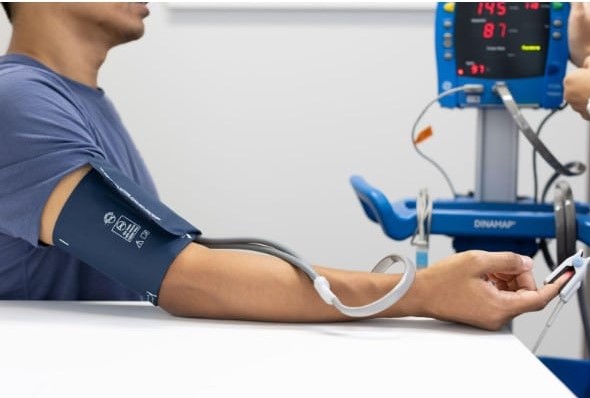Maintaining heart health becomes increasingly important once you’re over 30, and regular screenings can help detect potential problems early. Getting some key tests done is vital for evaluating your risk of cardiovascular diseases.
As you enter your 30s, it’s important to start paying closer attention to your heart health. While you may feel healthy, underlying cardiovascular issues can begin to develop without obvious symptoms. Regular heart tests are essential for detecting potential problems early and preventing serious conditions in the future. In this article, we’ll explore the key heart tests you should consider if you’re over 30, to help ensure your heart remains strong and healthy for years to come. Based on your overall health and risk factors for heart disease, a specialist, such as the best cardiologists in Mumbai at Apollo Hospital Navi Mumbai, can suggest how often you should undergo these tests once you reach the age of 30.
Key Heart Tests for Those Over 30
Here is a list of some important tests those over the age of 30 should get done:
Blood Pressure Test
A blood pressure test measures the force of blood against your artery walls as your heart pumps. It’s often performed during routine checkups or to screen for high blood pressure, also known as hypertension. Managing blood pressure is critical, especially as you age, since hypertension increases the risk of heart-related complications. Many people also use home monitors to track their blood pressure regularly. Here’s what different blood pressure readings indicate:
- Normal: Below 120/80 mm Hg.
- Elevated: Systolic (top number) is 120-129 mm Hg, and diastolic (bottom number) is under 80 mm Hg.
- Stage 1 Hypertension: Systolic is 130-139 mm Hg, or diastolic is 80-89 mm Hg.
- Stage 2 Hypertension: Systolic is 140 mm Hg or above, or diastolic is 90 mm Hg or above.
Lipid Profile
A lipid panel is a blood test that measures the levels of certain fats, known as lipids, in your blood. It typically includes measurements of triglycerides and three types of cholesterol: high-density lipoprotein (HDL), low-density lipoprotein (LDL), and total cholesterol. Elevated lipid levels can cause blockages in arteries and blood vessels, increasing the risk of cardiovascular issues like heart attack, heart disease, and stroke. Healthcare providers use this test to assess cardiovascular risk. The ideal levels for each lipid, measured in mg/dL, are:
- HDL Cholesterol: Over 60 mg/dL
- LDL Cholesterol: Under 100 mg/dL (Under 70 mg/dL for individuals with diabetes)
- Total Cholesterol: Under 200 mg/dL
- Triglycerides: Over 150 mg/dL
Blood Sugar Test
Over time, elevated blood sugar can damage the blood vessels and nerves controlling your heart. Studies indicate that even individuals with slightly raised blood sugar, below the diabetic range, have a higher risk of heart disease. This makes regular blood sugar tests essential, even for non-diabetics, to assess heart health risks. Common tests include the fasting blood sugar test, taken when no food has been consumed, where a healthy reading is 99 mg/dL or lower. Another test is the A1C, which measures average blood sugar over two to three months, with a healthy result being 5.7% or lower.
Read also: Exploring the Future of Healthcare with DocVAs Virtual Assistant for Healthcare
Electrocardiogram
An electrocardiogram (EKG or ECG) is a simple and quick test that measures the heart’s electrical activity to assess its health. The test helps detect irregular heartbeats, known as arrhythmias, and can diagnose heart attacks. It reveals how fast or slow the heart is beating, identifying conditions like tachycardia (fast heart rate) or bradycardia (slow heart rate). ECGs are commonly used for those with a family history of heart disease and can even be recommended for individuals without symptoms as a preventive measure. This test is valuable for detecting reduced blood flow, enlarged hearts, congenital defects, and other heart conditions.
Echocardiogram
An echocardiogram (echo) is a commonly performed ultrasound that assesses your heart’s structure and function. By using high-frequency sound waves, it generates detailed images of your heart’s movements, allowing healthcare providers to evaluate its pumping efficiency. Echocardiograms help diagnose conditions such as heart attacks, cardiomyopathy, heart valve disease, blood clots, and more. After the procedure, the sonographer sends the images to the ordering doctor, who examines them for indicators of potential heart issues, including abnormal ventricle walls, weakened heart muscle, impaired pumping action, faulty valves, unusual chamber sizes, or the presence of masses like tumours or clots.
Once you hit your 30s, regular heart health checkups become essential to catch potential issues before they escalate. Tests like blood pressure checks, lipid profiles, blood sugar tests, BMI screenings, and electrocardiograms play a crucial role in assessing your heart’s condition and overall health. Whether you have a family history of heart disease or want to be proactive, consulting a specialist is important to determine how often you should undergo these tests. At Apollo Hospital Navi Mumbai, some of the best cardiologists in Mumbai are available to guide you in maintaining your heart health for the long term.




